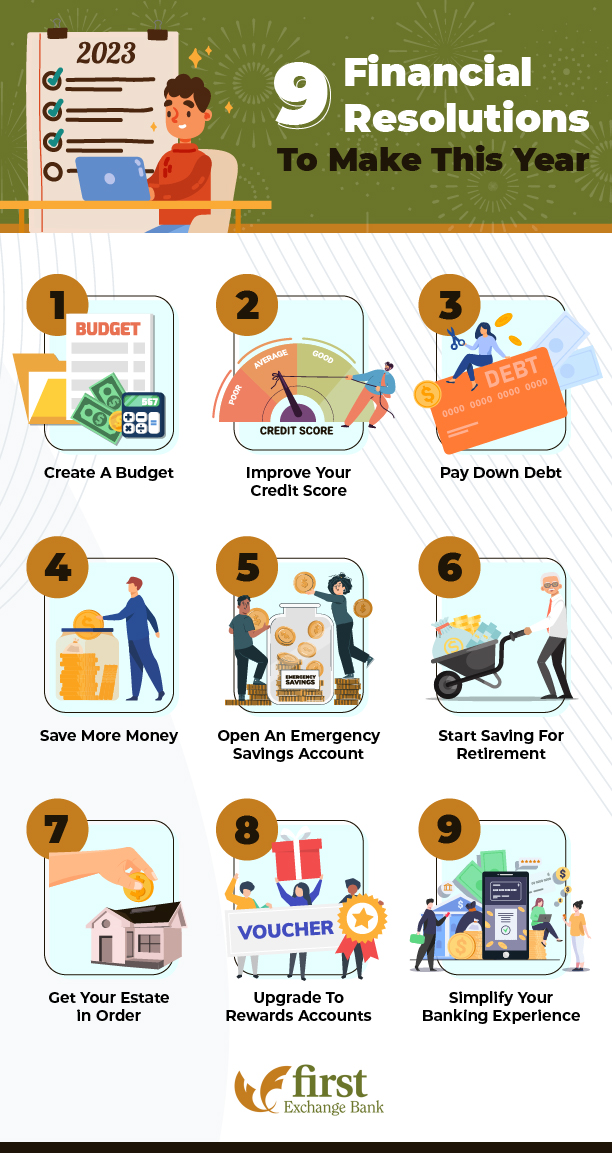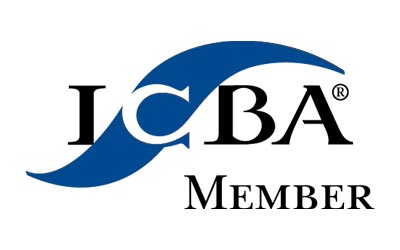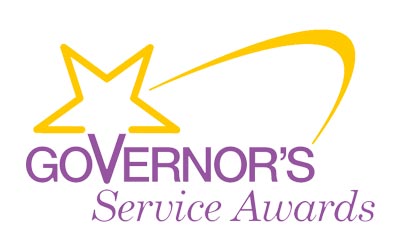There is nothing like a new year to bring a sense of fresh starts and wide-open possibility. As you think about the new year’s resolutions you want to make, don’t forget to include financial resolutions as well. A new year is also a good time to improve your finances, so keep reading for a list of financial resolutions that could help you reach your goals this year.
What are your goals for improvement?
The first step for setting financial resolutions is to identify areas of improvement in your financial life. We recommend doing an annual financial checkup to find out where you are doing well and where you could do better. Examples of financial goals for the coming year include:
- Buying your first house or your next one
- Starting that business you’ve been dreaming of
- Looking for a new job or switching careers entirely
- Starting your retirement
- Paying for a child’s college education or going back to school yourself
- Getting married
- Moving to a new state or city
Understanding the overall health of your finances and your life goals can help you understand where you need to improve, and what financial resolutions and goals you should make for the coming year.
Popular Financial Resolutions in 2023
Learn how to reach the goals that are on your list for 2023.
1. Create A Budget
If you don’t already have a budgeting habit, creating a budget should definitely be one of your financial resolutions for the new year. A basic budget consists of your total monthly (after-tax) income, minus your fixed monthly expenses (bills as well as necessities like groceries). Whatever’s left over is discretionary income that you can put towards savings goals, debt payoff goals, and fun stuff like eating out, etc.
Budgeting helps you get clear on where your money goes so you can make sure your spending aligns with your priorities.
2. Improve Your Credit Score
If your personal and financial goals include buying a house, starting a business, or taking out any kind of loan, you’ll want to have the best possible credit score. The higher your score, the better the interest rate and terms you can qualify for.
So, what is considered a good credit score?
- 800+ = Excellent
- 740-799 = Very Good
- 670-739 = Good
- 580-669 = Fair
- Below 580 = Poor
With the average credit score hovering around 700, there is still room for improvement for most people. Here are the best ways to improve your credit score:
- Pay your bills on time, every month.
- Don’t utilize more than 30% of your total available credit limit.
- Don’t apply for multiple new debt accounts at the same time.
- Keep your oldest accounts open.
- Use a variety of credit accounts such as installment loans, credit cards, etc.
3. Pay Down Debt
While some types of debt, such as mortgage loans, are generally considered “good” and don’t need to be paid off as quickly as possible, other types of debt can drag down your budget. In 2021, Americans’ average total debt balance rose to $96,371, a 3.9% increase from 2020. Of that, the average credit card debt balance is $5,221. If you’re carrying a credit card, student loan, or personal loan balance, it’s best to pay off these types of debts as quickly as possible. As the Federal Reserve raises interest rates in an attempt to slow inflation, interest rates on credit cards and other types of debt will also increase, making it more expensive to carry debt balances.
In addition to paying more than the minimum towards your debt balance, options for paying off high interest debt include:
- Consolidating multiple higher interest debt balances into one new personal loan.
- Leverage your equity as a homeowner with a HELOC or cash out mortgage refinance to consolidate your debt balances at a lower interest rate.
Need help managing your debt? The U.S. Department of Justice has a list of Credit Counseling agencies in California.

4. Save More Money
Whether you’re looking to save for a specific goal, grow your emergency fund, or contribute more to retirement savings, saving more money is always a great financial resolution to make.
- Look at your budget to see where you can cut spending to save more.
- Automate your savings so you don’t forget to transfer funds.
- Look into high-interest savings account options such as CDs and Money Markets so you can grow your savings faster.
5. Open An Emergency Savings Account
Are you among the 51% of Americans with less than three months of living expenses in savings? Maintaining an emergency savings account gives you peace of mind in the event of a job loss and helps you avoid taking on debt to pay for unanticipated costs such as medical bills, vehicle repairs, and more. Open a savings account for your emergency fund today.
6. Start Saving For Retirement
In California, the average retirement savings balance is $370,532. How much you need to save for retirement will depend on your specific situation. However, it’s never too early–or too late–to start saving for retirement. If your company offers a 401(k) or other retirement savings plan, you should contribute at least enough to get your employer’s match. Otherwise, you’re leaving money on the table. If you can, aim to contribute up to 15% of your income (including employer contributions) each year in retirement savings.
An Individual Retirement Account (IRA) is a great option for people without an employer-sponsored retirement savings plan. You can also open an IRA in addition to having a 401(k). If you have a 401(k) balance from a previous job, you can roll it over into an IRA.
7. Get Your Estate in Order
At the very least, every adult should have a last will and testament. If you die without a will, your assets and possessions will be distributed to your heirs as decided by the court. The intestate succession process is usually more complicated and costly for your loved ones than the normal estate settlement process. Each state has its own intestate laws, including quirks like California’s “requirement that heir survive decedent for one hundred twenty hours.”
It’s also important to designate (and updated as needed) beneficiaries to your life insurance policies, retirement savings accounts, and any other assets that pass through beneficiary designation instead of your will.
Finally, you may want to create a living will with instructions for the kinds of medical treatment you want or don’t want at the end of your life or while impaired.
Writing your own will is legal in California, but you may want to have an estate attorney draw up the legal documents for you instead. The California Lawyer Referral Service can connect you with an experienced attorney in your area.
8. Upgrade To Rewards Accounts
Why not get more out of the accounts you already use? If you pay for some of your everyday purchases with a credit card, you should be getting rewarded. Our Visa® Rewards Platinum credit card offers hometown convenience, worldwide acceptance and great benefits.
Also, most of our First Exchange Bank checking accounts (first Essential Checking, first Platinum Checking, first Plus Checking, and Now Checking) turn into rewards checking accounts when you sign up for our firstCashback Rewards Program.

9. Simplify Your Banking Experience
Life can be hectic, but your banking experience doesn’t have to be with First Exchange Bank’s banking products and services. Simplify your banking by signing up for online banking. You can reduce paper clutter with eStatements, save stamps by paying your bills online, and easily transfer funds between your First Exchange checking and savings accounts, as well as external accounts. You can also use online banking to manage your business. Do you have our mobile banking app yet? If not, you can monitor your bank accounts on the go, deposit checks remotely, and more with mobile banking.
Contact us for help reaching your financial goals!
First Exchange Bank is proud to be an independent community bank serving individuals, families, and businesses in North Central California. We offer a variety of bank accounts, loans, and services to help you keep your financial resolutions next year. Contact us or visit one of our seven offices located in Mannington, Fairmont, Morgantown, Hundred, Fairview, and White Hall.









